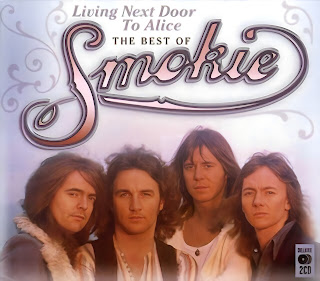Station to Station: Rolling Stones #52 of 500 Greatest Albums of All Time (2020)
Station to Station
Album: David Bowie
Released: January 23, 1976
Genre: Art, rock-funk, rock-soul, R&B, space rock
Singles:
Thin White Duke
The Duke's been described as "a mad aristocrat," an "amoral zombie," and "an emotionless Aryan superman." He sang intently of romance yet felt nothing—"ice masquerading as fire." Bowie later described the Duke as "a nasty character indeed."
Album: David Bowie
Released: January 23, 1976
Genre: Art, rock-funk, rock-soul, R&B, space rock
Singles:
Golden Years
Released: November 21, 1975
TVC 15
Released: April 30, 1976
Station to Station is David Bowie's musical bridge between the "Plastic Soul" of Young Americans and the experimental sound of his "Berlin trilogy." The album made the Top 5 on the UK and the US music charts. The Observer lists it as Number 80 of the 100 Greatest British Albums. Vibe magazine's 100 Essential Albums of the 20th Century includes Station to Station. It's Rolling Stone magazine's 2010 pick for Number 52 of the 500 Greatest Albums of All Time.
At its heart, Station to Station is an avant-garde art-rock album, most explicitly on "TVC 15" and the epic sprawl of the title track, but also on the cool crooning of "Wild Is the Wind" and "Word on a Wing," as well as the disco stylings of "Golden Years." Allmusic
Bowie recorded the Station To Station album after shooting Nicolas Roeg's film, The Man Who Fell To Earth. The cover is a still from the movie.
Single: David Bowie
Album: Station to Station
Released: January 23, 1976
Genre: Disco progressive rock, Art rock, kraut rock
Songwriter: David Bowie
"Station to Station," the title track to David Bowie's 10th studio album, introduces Bowie's last great "character." The Thin White Duke is a well-dressed, drug-addled, tortured soul interested in the occult.
During the recording sessions for Station To Station, Bowie was heavily dependent on cocaine and recalls almost nothing of the production. He once joked, "I know it was recorded in LA because I read it was."
In 2018, the writers of New Musical Express (NME) listed "Station to Station" as Number 17 of Bowie's 40 greatest songs. The Guardian ranked the track Number 3 of Bowie's 50 greatest songs; in 2021, Rolling Stone ranked it Number 400 in their updated list of the 500 Greatest Songs of All Time.
Thin White Duke
Clocking in at 10 minutes and 11 seconds, "Station to Station" is Bowie's most extended studio recording. For a full minute, sampled locomotives clatter from speaker to speaker. The coke-deranged singer makes his entrance at 3:17.
The return of the Thin White DukeThrowing darts in lovers' eyes.
The Duke's been described as "a mad aristocrat," an "amoral zombie," and "an emotionless Aryan superman." He sang intently of romance yet felt nothing—"ice masquerading as fire." Bowie later described the Duke as "a nasty character indeed."
Album: Station to Station
B-side: Can You Hear Me?
Released: November 21, 1975
Genre: Funk-disco
Songwriter: David Bowie
"Golden Years" was the lead single from Station to Station. Bowie wrote it for Elvis Presley. Both artists were signed to RCA Records. Presley's manager, Colonel Tom Parker, thought Bowie should write some songs for Elvis.
Elvis visited Bowie at The Studios in LA during the recording sessions for Station to Station and recorded a demo of "TVC15. " Bowie loved it, but Elvis wasn't happy with it and demanded it is left off the album.
 |
| Elvis Presley 1975 |
Bowie's ex-wife Angela claims the tune was written for her. But the two claims may not be mutually exclusive. Bowie may have written it for his ex, intending to have Elvis record it.
Wild Is The Wind
"Wild Is the Wind" was originally recorded by Johnny Mathis for the 1957 film of the same name. The track was a Top 40 hit on the US singles chart and received an Academy Award nomination.
Nina Simone covered the song as the title track for her 1966 album. Bowie met Simone in LA while he was recording for Station to Station. Inspired by her style, he recorded the tune as an homage to her.
Word on a Wing
"Word on a Wing" is the closing track of the Station to the Station's first side. Bowie explained to VH1 Storytellers he penned this song as a prayer to see him through a debilitating coke addiction that had him flirting with fascism and black magic. He recalled:
"It was so steeped in awfulness that recalls is nigh on impossible, undoubtedly painful, and I was concerned with questions like: 'Do the dead interest themselves in the affairs of the living?' 'Can I change the TV channel without the clicker?' Unwittingly, this next song was our signal of distress; I'm sure it was a call for help."
Single: David Bowie
Album: Station to Station
B-side: We Are the Dead
Released: April 30, 1976
Genre: Art rock
Songwriter: David Bowie
David Bowie wrote "TVC 15" after hearing about Iggy Pop's drug-induced hallucination. He thought a girlfriend was being consumed by her television set. The song peaked at number 33 on the UK Singles Chart and 64 on the Billboard Hot 100 chart.
Mojo magazine listed it as Bowie's 15th greatest song in 2015. In a 2016 list ranking every Bowie single from worst to best, Ultimate Classic Rock placed "TVC 15" at Number 12. Rolling Stone named it one of the 30 most essential songs of Bowie's catalog, calling it the "catchiest tune" on Station to Station.
Bowie performed "TVC 15" at the Live Aid concert in London in 1985, featuring saxophone by Clare Hirst and piano by Thomas Dolby.










Comments
Post a Comment